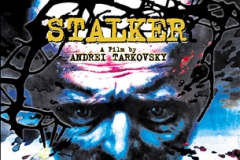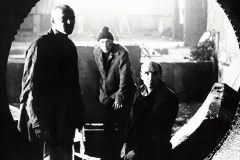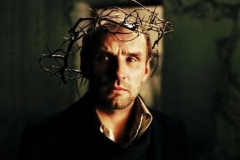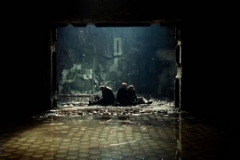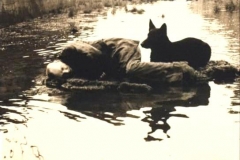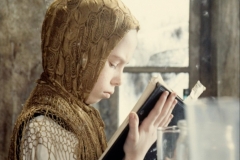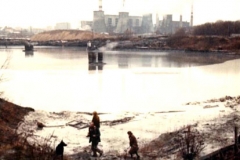A Conversation from the Zone
 by Benjamin Davis Brockman & Brian Gebhart
by Benjamin Davis Brockman & Brian Gebhart
February 1, 2013
After the opening credits of Andrei Tarkovsky’s 1979 film Stalker, a brief message rolls onscreen: “What was it? A meteorite? A visit of inhabitants of the cosmic abyss? One way or another, our small country has seen the birth of a miracle—the Zone. We immediately sent troops there. They haven’t come back. Then we surrounded the Zone with police cordons…” As we soon learn, the Stalker of the title is a man who guides people into the Zone, where, according to the legends, there is a room that will grant a person’s deepest desires.
Stalker is one of those rare cinema experiences that somehow engrains itself into your being.
It is a work of art that demands regular visitation, and with each viewing grows deeper and more mysterious. Presiding over a production that often seemed doomed—the difficulties encountered during the making of the film rival that of Apocalypse Now—Tarkovsky created an enigmatic film whose narrative is somehow inseparable from the story of its making. Based on the sci-fi novel Roadside Picnic by Boris and Arkady Strugatsky, Tarkovsky’s version bears little relation to its source, as the director decided midway through filming to abandon the sci-fi element entirely. Even so, the film did eerily echo one future event—the Chernobyl disaster in 1986, which led to the establishment of Ukraine’s real-life Zone of Exclusion.
Writing about Stalker is an extraordinary task because every trip to the Room is different—as different as we are each time we embark upon the journey. The film’s protean quality stems, in large part, from the transcendently hypnotic nature of its camerawork. At 163 minutes long, Stalker contains a mere 142 shots (with single shots often lasting for several minutes). The slow-moving shots and rich sound design create a bleak, yet mesmerizing world, in which each cut, each object, each movement of hand or eye, seems imbued with purpose.
Geoff Dyer was not daunted by his task in Zona, which is cheekily subtitled, A Book About a Film About a Journey to a Room. The book is not a definitive study of Stalker, nor does it aim to be. Rather, Dyer describes the experience of watching his favorite film, weaving critical judgments together with a scene-by-scene summary, highly personal memories and musings with hard facts about the history of the film and its maker. In this way, he’s produced another fascinating book that knocks down the barriers between criticism and memoir.
As fans of both Stalker and Zona, a traditional review or critical essay didn’t seem sufficient to address the film, the book, and the relationship between the two. So in the spirit of Dyer’s endeavor, we sat down one afternoon shortly after we’d both read Zona, put in a DVD of Stalker—with the sound (usually) off—and recorded our thoughts for the duration of the film. Our conversation has been edited for clarity and readability.
Benjamin Davis Brockman: The biggest thing that I think about when I think about his book is the comparison of the Zone to an entry into cinema itself.
Brian Gebhart: I’m not quite sure what Dyer meant by that, though.
BB: He talks about the experience of seeing it in the theater and how the viewer must be watching it in the theater to gain access to the world that Tarkovsky’s created. I’ve heard Tarkovsky say in interviews that he agrees. There’s a select few people that think it’s one of the greatest films ever made because of its reflexive nature—without being reflexive in the way that, like, The Player is; it’s not about movies—but he thinks [Stalker] is also about Tarkovsky’s philosophy of film.
BG: You’ve got the writer—the character of Writer—who represents that. Dyer says when somebody complained to Tarkovsky that the opening was kind of boring—you know, it just goes on for so long, the shots are so long—Tarkovsky’s reaction was, “It needs to move even slower.” His reasoning for that being, just in case somebody had wandered into the theater not really knowing what they were going to be watching, they would have a chance to get up and leave… I almost feel like Dyer does the same thing in Zona. The beginning is very slow and very digressive, and it’s not really until about two-thirds of the way through the book that I feel like he reaches that sweet spot where they’re finally nearing the Room in the film. And that’s when his own ideas about the movie—about desire and about magic and about possibility—all start congealing into something larger.
BB: Well, and he talks a lot about the Room right at the end of the book. ‘Cause arguably, that’s the crux of the film—at least as far as the characters go—to arrive at this place where wishes can be granted. He spends a fair amount of time on the idea that nobody ever really wants their deepest desire. And I don’t know if that’s because of the way he wrote it—while watching the film or what, but he has it arranged to mirror his own experience.
BG: I feel like the other way that the book mirrors the movie is that the approach to the central idea is always circuitous, you know? Just like in Stalker, they can’t walk directly to the Room and go in—they have to approach it by this roundabout route. I feel like the same thing ends up happening in the book. He talks around the central themes and ideas—puts forward one idea and runs with it for a while, but then will back away and put forward another idea.
#
BG: It seemed to make sense, somewhere early, to talk about how we encountered the film first and what kinds of influences that has had. You were the first person who introduced me to the film. I think I was probably 19 or 20. And I remember being entranced by it, and it was always kind of lingering in the back of my mind, and then I finally watched it again last year. I’d been working on a novel for going on three years now where the characters discover this vast, subterranean space that has—or they think has—some kind of mystical power. And so watching Stalker again, I couldn’t help but wonder, what came first? Did that embed into my mind, or was that always there and that’s why the movie resonates with me? So I was wondering your take on that, because you seem to be drawn to a lot of the same ideas that Tarkovsky was—or maybe even that Tarkovsky didn’t know he was anticipating, like Chernobyl, which happened just a few years after the movie. Do you think the film had an impact on you, or do you think that you were drawn to the film because of your preexisting concerns?
BB: I think both. I remember very vividly my first encounter with the film. It had a really crazy box, and I saw it at this video store in Moscow, Idaho—this little video store called Howard Hughes Video. I was with friends, and we were just looking for movies. We had no idea what it was going to be about. But it had a double box, so it looked really massive and epic and something you could really get your teeth into.
BG: The one with the close-up of the face?
…Dyer talks about, paraphrasing Tarkovsky, that if you hold a shot for long enough, people will get bored. But then if you keep holding the shot for even longer, they’ll move past boredom into a kind of heightened attention…The movie conditions you to view it in that way by holding some of the shots for so long.
BB: Yeah. And I must have been 11 or 12. And I remember being similarly entranced by it but having no idea what it was about. I just didn’t have the attention span at that age. I’ll admit to having difficulty with watching this movie in its entirety now… With Chernobyl. I actually had it mixed up. I thought that this movie had been made after Chernobyl, when in fact it was seven years before. So I looked at it as a resource for writing a thesis paper about my artwork, and I decided I was going to watch it again and do some reading about it, reading about Tarkovsky. And the parallels are pretty astonishing, even in the fact that several crewmembers died filming this movie—from [a polluted water source] in Estonia.
Certainly my interests—the metaphysical, the magic of nature, the quietest places on earth, and the things that we leave behind us when we leave a place—are all there. Being a total cinephile, the movie bears dozens of viewings over the years, and I think that’s what makes it a great film. It reveals itself over time.
It’s just eerie that there are so many correlations. I mean, the Zone—they call that area in Chernobyl that was evacuated the Zone of Absolute Resettlement or the Zone of Exclusion. And because of where they filmed it, it’s got a very similar landscape. The things we see about the landscape that are left behind—the houses and stuff—if you go through and look at photographs of Chernobyl today, it’s uncanny. And the fact that they find all these military vehicles when they’re walking around. So that’s a pretty big detail, I think.
#
BG: One of the most interesting details I got out of Zona was the fact that they’d planned to shoot in a completely different location—I think it was Tajikistan—in a desert area. The location looked kind of like a moonscape, very otherworldly, very alien. And I forget why, but that location fell through. I think it was an earthquake. So they found a location that looks totally different. It’s lush and green. There are plants all around. It’s hard to imagine this movie existing anywhere else.
BB: I think there’s something about the way it’s filmed. There’s so few shots in the film, and they all last so long. The editing is all very gradual. Shots can last for minutes, so you get the sense of this serene natural order that exists in this place. I feel like it really could have been shot anywhere.
BG: I agree that so much of the atmosphere is created by the way the camera moves—or doesn’t move, or lingers on things for so long. Everything has a kind of heightened presence. It’s hard to describe.
BB: That may be a good place to talk about how we get there, right? The experience you have outside the Zone, on either end of the film where it’s kind of bookended that way, is distinctly different. We had just talked about how part of that is because, like The Wizard of Oz, the entry into the world becomes a distinct change into color. And part of that was due to what happened to the film because of Apocalypse Now-style production problems, which were really expansive, and kind of a tragedy for Tarkovsky, I guess. He had a pretty big meltdown.
One of the seminal shots that Dyer talks about is the entry into the Zone, where the three guys are on this train—they’ve gone through this whole rigmarole to get past the military to get into the Zone. They get on this train, and there’s these really long shots, with this amazing music, and it’s entrancing. It’s not suspenseful, but you start to develop a real curiosity about what they’re going to find.
BG: That links up to something Dyer talks about, paraphrasing Tarkovsky, that if you hold a shot for long enough, people will get bored. But then if you keep holding the shot for even longer, they’ll move past boredom into a kind of heightened attention. And that seems to be what Tarkovsky wants from his viewers. The movie conditions you to view it in that way by holding some of the shots for so long.
Boredom was definitely something that comes up. Dyer references Antonioni as a comparison early on and basically confesses to being maddened, nearly unable to watch Antonioni’s films, which I agree are beautiful but incredibly boring. So I was wondering with Stalker, which is every bit as slow an Antonioni film, why doesn’t it feel boring? And I was also wondering, does Zona risk that same thing? Does it ever cross over into boredom?
BB: The book—if it’s boring, it’s because you start to wonder, “What’s relevant about this tangent that he’s going on?” But it ends up being relevant. When you get through the book, you start to realize part of cinema is everything surrounding your experience of the cinema, everything you bring to it, every place you come from.
As far as the movie being boring, I think you’re going to find two camps of people, and it’s going to be a pretty big divide. There’s not going to be a lot of people in the middle on whether or not this movie is exceptional. Photographers will find—and Dyer’s written books on photography, which I didn’t know—every shot being pretty immaculate in composition. So there’s a lot to study.
BG: I wonder if, in that way, the first time you watch the movie is the most difficult. Because we’re sitting here watching it again, and I’m finding myself more and more entranced by it. I think every time I watch it, it grows more engrossing, which is not true of most movies.
BB: No, it’s not. A good example of this would be Tarantino, for me—Inglourious Basterds, for instance. When I saw Inglourious Basterds, I was pretty riveted by it. A couple years later, the next time I watched it, I didn’t find it nearly as compelling. It was really like eating a box of candy, whereas the first time I felt like I’d consumed a really unhealthy but satisfying meal. And this movie is like—I don’t even know what kind of diet you could call this film, because it’s really an experience. I can’t think of another film I’ve seen that has the same effect—when it’s over, that you feel so nourished.
BG: Yeah, because it is so all-encompassing. I also think, from a narrative standpoint, one of the virtues of the movie—for a movie that’s as slow as this is—is the fact that we have a destination, we have a goal. We know the characters are going to a certain place, and we’ve been promised that it will be something incredible. And so that’s one thing that can hold our attention throughout the film. All of the elaborate procedures that they have to go through is a way of keeping us in suspense, which is why I think that the scene where the Writer tries to march straight to the Room and gets scared—because of some vaguely supernatural things happening—is key. Because it’s almost a message to the viewer of, “No, you need to be patient. You have to wait and let this thing develop, or otherwise it won’t be nearly as incredible and magical as you’re hoping it will be.”
BB: I think he says something in the book to the effect of the experience being very similar for the audience to the experience that these men have of the Zone and of the Room. Because it’s extremely anti-climactic. For the whole movie, these guys have been told, we’re going to this place where any wish you have will be granted. And we’re not really clear what these guys want, but we know enough about each of them to know that whatever it is probably isn’t for, like, the greater good.
BG: Power or money or love—
BB: And surely it’s going to cross your mind what you might want if you were in their situation. So I think you share this experience so much with these guys. The Stalker is by far the most interesting to me because he’s got this burden, which he also loves and has this passion for it. He says over and over, “I wanted to show you this place,” and really his gift is to recognize it as amazing. He is the seer, not the purveyor, which is what these other guys, in their professions, claim to be. It’s like, “Are you going to be somebody who’s going to appreciate this world? Are you going to be able to adapt the keen sense that it takes to see the beauty here? So are you a Stalker or are you one of these other people as a viewer?”
[Tarkovsky] had the ability, like we were saying of the Stalker, to see. That is the primary skill that artists have. And that also drives your desire and your passion and your need to show the things that you see.
BG: Yeah, and the Stalker is very much in the role of the believer. He holds the faith, whereas the other two are skeptics. And that was another thing that was interesting to learn from the book, is that Tarkovsky had originally conceived of the Stalker as more of—I think he said he changed him “from a bandit into a believer.” And his belief kind of carries the viewer along with it, because we can invest a little bit of ourselves in his belief and let that lead us.
BB: You know, it’s occurred to me before in watching this movie that the Stalker has this burden of showing things, showing this world to people. And I think that may be a little bit how Tarkovsky felt about his job as a director: a burden that he absolutely loved. But that’s what I find so interesting about the Stalker. If the Zone is cinema, then he is your guide through cinema. And what you bring to it is going to be your own luggage, really… He was really an auteur. I mean, the auteur, in my mind, is not the person who writes and directs the movie—it’s the director who has the ability to write as he’s directing, to write with the camera… You have the distinct feeling that you are being shown this through his cognitive lens, through the way he understands the world around him.
BG: So then, if you’re watching the movie of an auteur, you’re seeing through their experiences, their frame of references, their influences—all the movies they’ve seen or books they’ve read or whatever. And of course that’s also a much more writerly sense of self or sense of…ego, I guess?
BB: Yeah, I think ego’s the right word.
BG: In the sense that a writer controls everything, at least up to the point that you finish a manuscript and send it off. But up until that point, you really do control everything that goes onto the page in a way that the vast majority of filmmakers don’t. Probably no filmmaker does, but some do to a much greater extent than others, and I guess that’s why they use the word auteur.
BB: This is somebody who had the ability, like we were saying of the Stalker, to see. That is the primary skill that artists have. And that also drives your desire and your passion and your need to show the things that you see. So if Tarkovsky was on location and he was seeing these things, he was probably like, “This right here is fucking magical. Let’s shoot that.” And I know for a fact that [Terrence] Malick does that. He’ll wander out with a camera, and the whole crew’s wondering where he is. Well, he’s just getting hours and hours of static shots—just shots of stuff happening—which ends up buffering the length of his films considerably. And then production companies will be like, “There’s no way we’re going to put out a six-hour movie.” One of the great—maybe not tragedies but mysteries of Stalker—is that we don’t have the other version to look at, the original film that was all destroyed in processing. So we don’t have that, and Tarkovsky didn’t have it either. So there again, so much of the creative process is responding. At some point he said, “We’re not making Roadside Picnic anymore—from the book. We’re not making that anymore. We’re not using the script that was written. We’re making another movie now, which is very much about the experience of making a movie.”
BG: Wasn’t that also the moment that he decided it was no longer a sci-fi movie?
BB: Yeah, it changed genres right in the middle. Part of the reason that you can come back to it so many times is that you can say, “I’m going to view this movie as a science fiction movie, starting right now.” Or, like, “I’m going to watch it as a post-war movie.” Or, “I’m going to watch this as a metaphysical study of nature, or post-nuclear nature, or whatever.” So there’s so many different ways to come at it. And it’s really none of those things.
BG: Well, it is what it is. I think that’s what Tarkovsky would say, right? It’s not meant to symbolize or to reference anything outside of the movie in particular. It’s meant to be a world unto itself. But of course viewers can never help—
BB: Making those associations.
BG: Yeah, you can’t help the temptation to see—so we’re just watching a long shot of debris in shallow water. And there’s a syringe, and there’s a gun, and you see things like that. Well, what does that mean? Obviously that is in the film for a reason, but it’s impossible to really pin it down. The even more obvious example—which is one that Dyer talks about quite a bit—is toward the end when they’re outside the Room and Writer weaves together a crown of thorns and puts it on his head. But it’s Dyer’s opinion that somehow, magically, that crown of thorns doesn’t really make us think of Christ or make us think that Writer is somehow a martyr. That somehow, only in a film like this, only with an artist as great as Tarkovsky could a character put on a crown of thorns and have it really just be a crown of thorns, for no particular reason.
BB: It’s so common in cinema, and has always been common in cinema, for audiences to want to be spoon-fed directly what they’re seeing, to know what the relevance of something is. I think—and this is something that so many people have a hard time with, with art in general—the meaning can be the feeling itself. So if there’s anything I could tell somebody who hasn’t seen this movie to try and get them to give it a shot: just sit down and experience it and just feel it.
BG: I think about Malick, and at least in his more recent movies—actually, I’m thinking in particular about The Thin Red Line and The New World—where there’s so much philosophical musing in the movie about deep, profound issues of life and God and existence itself and love and death. And yet, when I think back to those movies, I can’t remember any—
BB: Any of the specific things that were said.
BG: Yeah, it’s not like you take away a phrase because it was so beautiful, even if it was. You take away the feeling—the experience you had while you were watching it.
#
BG: [Dyer] talks about how he was early 20s or mid 20s when he saw the movie for the first time and became obsessed with it. He mentions that he think nobody watches their favorite movie after they’re 30, that there’s something about being young that maybe makes you more open to some great work of art.
BB: Well, I just don’t know if—I mean, I’m almost 33, and I am fully open to the notion that I may yet see my favorite movie. But I think there’s a point at which films can cease to be formative. Like, I’ll never experience a film the same way I experienced the first time I watched Pulp Fiction or something. Because there’s something so massive about cinema at that point in your life. Cinema has a hugeness to it, and I wouldn’t say that the power decreases, but because as you get older, if you maintain an interest in cinema, then you start to understand how it works and you start to understand how films are made and the types of people who make them and what money has to do with it and all of that. And so just like everything else in your life, your naiveté kind of falls away.
BG: And that’s interesting that it seems like it almost may be…work to maintain that, that as you get older, maybe it becomes more of a conscious effort, if you walk into a movie, to be open to something new or vast.
BB: Well, I can’t tell you how many times I’ve heard people say that as they get older, they don’t want to see things that make them think too much. I’ve heard my dad say that. My dad’s an artist. My dad’s a designer for theatre, and I’ve heard him say that. And as I get older, I understand it. Because sometimes the speed and gravity of life are just too much, and you want what every art form is, which is some escape or distraction or diversion from life. And if that form of art bears too much of a resemblance to life, then it can be painful.
BG: Yeah, well, I definitely find that with books to a great extent. I feel like when I was younger, I had more energy to, say, read The Brothers Karamazov. But it’s like, at this point in my life, I haven’t read War and Peace. And I don’t know if I’ll ever have the energy or the time or the patience… It’s kind of a weird catch-22, though, too. I read Moby Dick when I was 20 or 21 because it was one of those books that I thought, “This is something that you have to read.” If I want to be a writer, if I want to be educated about literature, I have to have read Moby Dick. And I’m glad that I read it. But I also think, as a 21-year-old, surely I didn’t get a lot of the stuff out of that experience that I would if I read it today, 10 years later, having read so many more books now, knowing so much more about how literature works [than I did] when I read it. So on the one hand, the older you get, you’re less open to the newness and the mystery of that experience. But on the other hand, maybe you know a little bit more, and so maybe you’re more prepared or able to truly understand a great work of art. So I guess the answer is, you have to do what Geoff Dyer did with Stalker and see it when you’re young, and then keep watching it throughout your life. Which is a huge investment of time. I guess you just have to pick your seminal moments, your seminal works to come back to as touchstones.
#
BB: So we’re at the part right here where one of the most interesting things in the movie happens—and truly one of the only things that happens while they’re in the Zone. They are arguing and they’re saying nothing at each other, just yelling at each other. And all of a sudden, this phone rings, which is so mysterious and crazy to think about, that they would be in this place and someone would just by chance happen to call this one phone that they’re standing next to. The odds are insurmountable. I never thought it was funny until I watched it just the most recent time. But you needed this…[snaps fingers]. “Whoa, hey, I am in the world. I exist. I’m watching a movie. I’m not there with them.” And [the characters] are like, “Oh, wait. I am in the Zone, but the Zone is part of the larger world.” Because for all intents and purposes, this world is completely unreal and surreal, but it is part of the real order, and it obeys certain laws.
BG: Somebody dials that phone number, the phone rings.
BB: Yeah.
BG: You can pick it up and talk to somebody.
BB: That still happens even in the Zone… I think that’s Dyer’s contention—where you’re sucked through each of those independent portals down to a moment of reality, and you remember, “Oh, yeah, they have to leave here. They have to get back to this other place. And we as viewers have to leave this place too.”
BG: Yeah, it’s that moment of serendipity. The phone could not have rung at a more perfect moment within the film. Dyer talks about that several times in Zona. Something will have occurred to him—he’ll be on one of his digressions, thinking about something, and he’ll reference a film or a book or some experience he had—and then just a few pages later, something similar will crop up in the film. He’s always referring to that as Tarkovsky’s genius of being able to anticipate the viewer’s thoughts and sort get out ahead of them, so it’s almost cueing you to imagine certain things or think of certain things right before something that echoes that happens in the film.
BB: And you’re right, I think that Dyer really mirrors that in the way he writes his book. Certainly, when I picked the book up, it ended up being nothing like I thought it was going to be. I thought it was going to be, like, a shot-by-shot, and parts of it are. I thought it was going to be more of an academic—
BG: Like an analysis?
BB: Yeah, like an analysis. But it does contain every bit of that in a really sporadic, sprawling way.
BG: Again, that’s a way that the book imitates the movie. He gives you space—or I suppose he gives himself space for his mind to wander, in the same way that the movie gives the viewer space for your mind to wander. In fact, I’d be interested to actually sit down and read the book cover-to-cover in one sitting. It’s a very short book—
BB: Yeah, it’s pretty fast.
BG: And I wonder how close the time it takes—it would differ for every reader, obviously—but I bet it’s not much longer than the movie…
BB: I super have to pee.
BG: Okay, go for it.
BB: Be right back.
#
BG: Where do we go from here? We’ve been snatched out of the realm of the Zone.
BB: Yeah. We were really in it, too.
BG: Was there anything you wanted to talk about that we didn’t get to?
BB: It’s worth talking more about the Room, I guess. Because [Dyer] spends a long time talking about it, and it really opened some things up to me that I wasn’t—
BG: In the movie, Stalker, when he’s trying to get the Writer to go in, tells the Writer to think about the past because it will make him kinder. So there’s this idea that you have to approach the Room with a kind of innocence, a kind of openness, in the same way that you would think about approaching a religious experience—of laying your soul bare. And then Dyer takes issue with the idea that thinking about the past will make you kinder, and he says that the older you get, it’s probably the reverse.
BB: Yeah, that’s exactly right.
What they get at the end of this big, long journey is a feeling of their actual intentions. Their intentions are kind of laid bare to themselves.
BG: Thinking about the past makes you bitter and regretful. On the subject of regret, that’s one of the things he proposes: that one’s deepest desire might be the same as one’s deepest regret.
BB: A truly innocent and guileless person would not remember his past with bitterness and would not wish to go back in time to fix something or wish that things were different. A true innocent—the type of person you would want to enter the Room—probably does not exist. And I think it’s really interesting to think about what the Stalker is as a person. Is his gift somehow in that? In his capacity for understanding or for living in the moment or something?
BG: A kind of innocence.
BB: Yeah, a kind of innocence. Even though clearly, his life outside of the Zone is not much to envy.
BG: His marriage doesn’t seem very happy.
BB: And his wife is pretty upset with him, and he gives her every reason to be. He’s really distracted and really kind of pitiful outside the Zone. But in the Zone, he’s got all this purpose. In reading it, when [Dyer] put it that way, it almost made me not want to think too much about what my deepest desire would be. I would just as soon not know what that is.
BG: Well, it’s very revealing, right? If you really could know that. And that’s another thing he talks about, is that maybe it’s impossible to know what one’s deepest desire is. In the movie, the only time we hear about somebody actually going into the Room and having their wish be granted was Stalker’s mentor, Porcupine, who supposedly enters the Room and then leaves and becomes fabulously rich, and then a week later hangs himself. I don’t remember whether it’s Stalker who suggests this or whether it’s Dyer who suggests this—but the idea being that the reason that Porcupine hung himself is that he realized that his deepest desire was for money. And what that revealed about him was so terrifying that he couldn’t bear to live with himself anymore.
BB: Yeah, I think that’s true. I think that these guys don’t really even know who they are. And the simple fact of the matter is, they don’t need the Room. The Room may not have this power. The Room may not have anything to do with anything…
So it’s almost like this Biblical lesson. It has this allegorical thing that’s a lesson for everyone… It’s much more complicated than that.
BG: I think that’s true. But there again, it’s kind of a paradox or a catch-22, that you can know that on an intellectual level, but can you really feel it? And that’s what the journey is for, is to have it become ingrained in your instinct so that you truly feel it in a way that you won’t just—that you’ll understand it more, I guess.
BB: What they get at the end of this big, long journey is a feeling of their actual intentions. Their intentions are kind of laid bare to themselves.
BG: That’s interesting. You say their intentions are laid bare but not their deepest desires. And I think that distinction is key, because that’s another idea that Dyer proposes, is that maybe a person’s deepest desire is to have one’s deepest desire kept secret from oneself.
BB: Instead what they get is a dose of their own pettiness. After I read that—having never really thought about that before—I don’t really want to know that about myself. If I don’t already. Maybe I already do.
BG: Well, it is easy to understand why they’re so terrified at the Room. If they’ve come to believe in its power, which I think they have, then it’s understandable why it’s frightening. And it’s interesting that the person who’s most obsessed, Stalker, is the one person who we know can never enter the Room… That might connect to something Dyer mentions, which is that late in his life, in an interview, Tarkovsky was asked, “Is the Zone actually just Stalker’s invention?” And he apparently said yes, or said something to allow for that interpretation, that the Room is a manifestation of Stalker’s desire as much as it is anything else. Who knows what to do with that?
BB: The only thing I can really make of it—oh, and here we are outside the Zone. The craziest transitions—the fish with the black water—all of a sudden, bam, we’re outside and overlooking a nuclear power plant. We don’t even know what to do with that, but the fact that they live right next to it is pretty fucked up.
BG: [laughing]
BB: Just as we were at the beginning, the three guys at a bar. It’s like telling a joke or something: what happened when the Writer and the Professor and the Stalker met at a bar. Well, all of this happened, and then they came back at the end.
BG: Yeah, it does have that classic structure—a circularity to it. They begin in this place and then return to it.
BB: Well, it’s got this mythological journey structure with the archetypes in it, kind of mirroring, like, a Japanese samurai film or something, where they go through this experience and the heroes return with a greater knowledge of self, which is the classic Joseph Campbell explanation of most stories. Here, they just don’t really like what they know now.
BG: They haven’t triumphed over anything.
BB: Yeah. In fact, they’re defeated. They’re sitting here at the bar defeated by the experience.
BG: Yeah, they look horrible. They look like they’ve seen their own ghosts.
BB: Oh, and the dog [who returned with them from the Zone]. It seems like he’s some kind of omen. But if the dog were to enter the Room—to have its true nature revealed to itself—that might be the creature you want in the Room.
BG: Dyer proposes that as one of the many possibilities when he talks about what the Room really is or what really happens at the end. Maybe the dog is the one who entered the Room, and the dog’s true desire was to be adopted by humans…
BB: [laughing]
BG: And go home with them and leave the Zone. Which he does. We kind of think this is going to be the family pet now. They go home and they pour out milk for it to drink.
[Stalker and his family walk past a nuclear facility]
BB: This reveal of this power plant is so astonishing. It’s almost like the punch line, in a sense.
[The final scene begins, showing Stalker’s daughter, Monkey, sitting at a table with three glasses on it.]
BB: And she’s reading. Does he reveal to us what she’s reading?
BG: I don’t think so.
BB: That is the image on the cover of [Zona], which is the only image from the movie anywhere in the book.
BG: [reading from Zona] “Monkey lays down the book as if she has been memorizing what she was reading—which turns out, or so the voiceover would have us believe, to be a love poem by Fyodor Tyutchev… Bjork got her lyrics to her song ‘The Dull Flame of Desire’—on the album Volta—from the English translation of this poem, acknowledging Stalker as the source.”
[Monkey sets down the book and stares at the glasses, which begin to move across the tabletop]
BG: Immediately after that glass drops off the table, that’s when the train appears.
BB: You hear the train coming well before it’s felt.
[The sound of a train rushing past]
BB: The structure of this shot is so amazing. Everything that happens is so [inaudible]. The dog is whining. She looks at the dog. The dog shuts up.
[Beethoven’s Ode to Joy playing]
BG: Of course she has to glance up and make eye contact with the camera, right?
BB: Yeah, she looks at the camera, but very subtly, almost as if by accident, as if she’s waiting for the director to tell her the shot’s ended or something. It’s clearly difficult not to read more into it… See, that last shot, to me, it almost feels like kind of a belligerent button at the end to kind of get a rise out of the audience.
BG: [laughing]
BB: Just to be like, “Were you fucking paying attention?” It’s almost aggravating, but at the same time, it’s so satisfying.
BG: You want to go, “But wait!” You want to somehow trace that back to the Zone and make the connections, but the movie’s over, so there’s nothing more to be done.
